Attending EduCamp, an unconference for higher education
Last month I attended a one-day UK EduCamp unconference at the University of Sheffield. The relaxed format provided lots of opportunity to discuss and learn about burning topics for digital teams in the sector, and to connect with colleagues old and new.
What’s an unconference?
Wikipedia says: “An unconference is a participant-driven meeting. The term “unconference” has been applied, or self-applied, to a wide range of gatherings that try to avoid hierarchical aspects of a conventional conference, such as sponsored presentations and top-down organization.”
Wikipedia page on unconferences
So in essence:
- People assemble around a given theme or shared interest
- Attendees make pitches for things they’d like to share or join a discussion on. (Or indeed, something that they’d like to learn about even if they don’t feel they have anything in particular to contribute).
- Facilitators group like topics together and assign them to slots on a pre-defined timetable
- The sessions run along the timetable that has been created during this introductory session
- That’s pretty much it.
…all I really want from an unconference is a participant generated agenda, a safe space to chat and a bunch of good people…
Matt Jukes – Minimal Viable Unconference
Why I went
I’d only been to one unconference before. It was back in 2017, and was the first time we’d had something arranged in the Scottish public sector by OneTeamGov. I had really enjoyed the experience so was interested to see what a higher education-focused session might deliver.
The unconference was brought to my attention by someone I’ve known for a long time through the UX Scotland and SDinGOV conferences. While attending a social at this year’s UX Scotland, Mark Dalgarno (of digital consultancy Create/Change) and I cooked up a plan to run a workshop at the unconference, and we shaped up our proposal over email.
Finally, the event was being held at the University of Sheffield, where I’d begun my higher education career a long time ago. So it was a great way to see a little of a city I love and catch up with old friends and colleagues.
Setting up the day
The first hour or so of the event was given over to establishing the time table of sessions.
We’d been primed in advance to think about things we’d like to propose. As I’d been in dialogue with Mark Dalgarno, we had something reasonably well-prepared. (I’m sure the majority of people didn’t bother with the light planning we did in advance though).
We all queued up to take our turn to speak for 30 seconds or so to the group about our proposal. While in the queue, I thought of something else I’d like to discuss and share so by the time we got to the front I had an extra item for the agenda.
As each item was proposed, the associated post-it note was handed over to a facilitator who found a place for it in the schedule. Sometimes related themes came up and were agreed to be grouped into a single session.
Some people contributed multiple ideas, some people didn’t contribute any. Some people had something they wanted to contribute or facilitate, some just wanted a topic on the board but didn’t want to lead it.
Some people wanted to contribute something but didn’t feel comfortable standing up to pitch. Facilitators in the room were on hand to help make sure everyone’s contributions were heard.
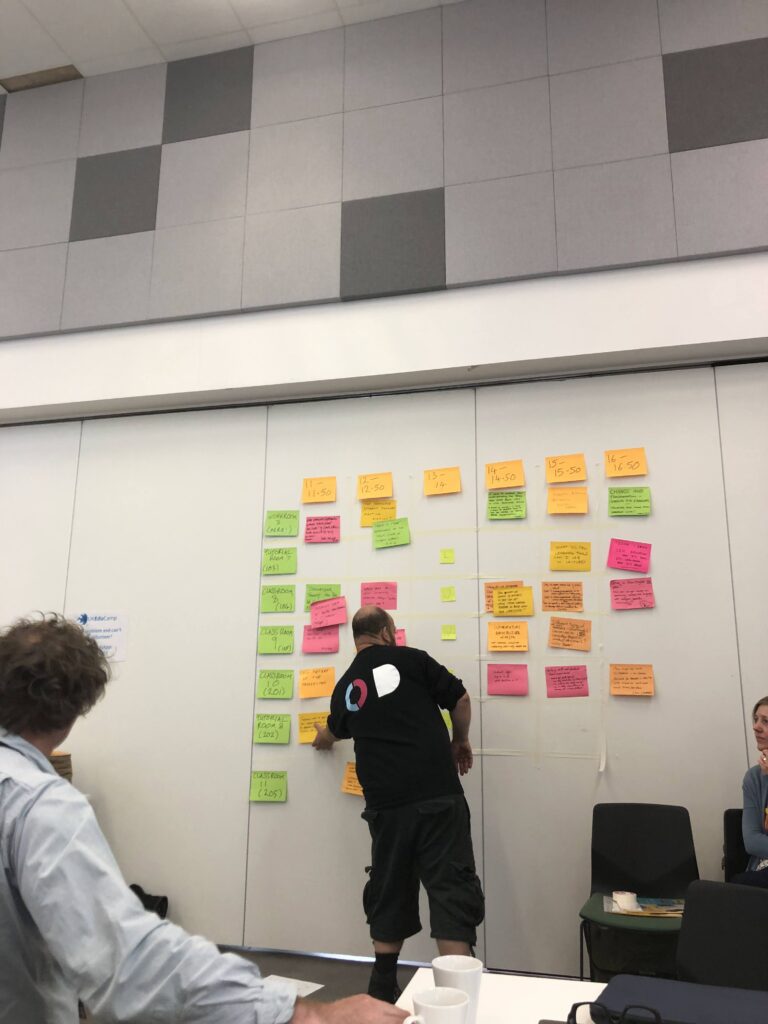
A facilitator took the pitch summaries after each was delivered to the group, and began arranging them into a timetable for the day.
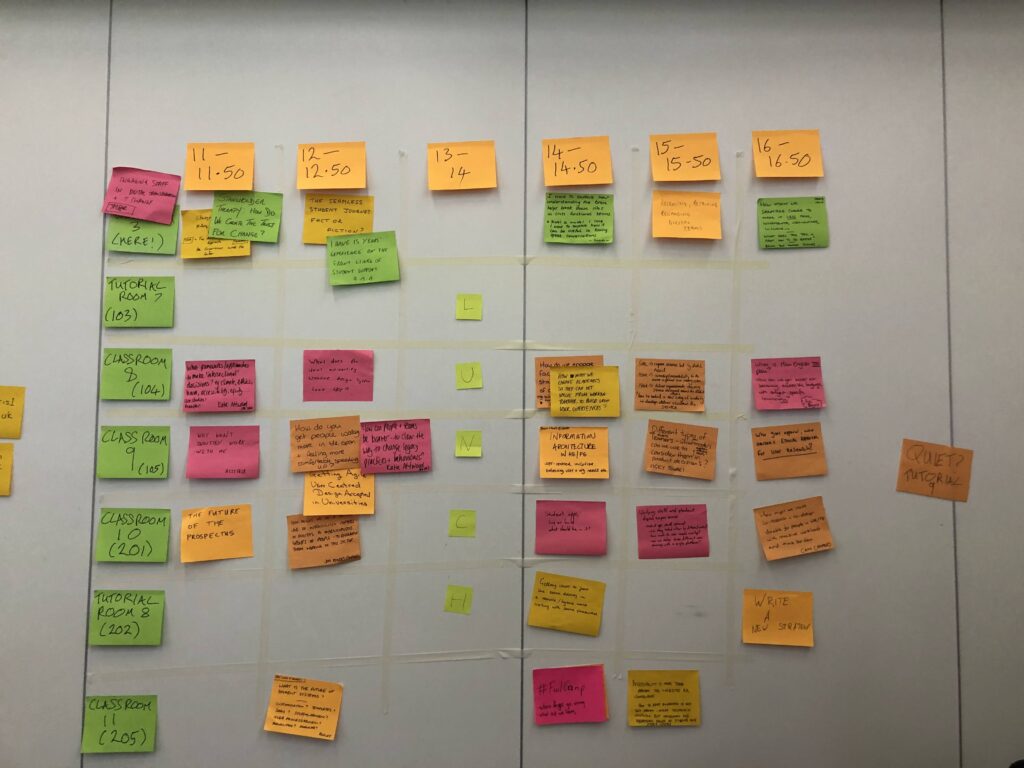
The unconference timetable remained on the wall all day, and attendees kept returning to decide what to do next.
The sessions
The sessions I attended were:
- Stakeholder therapy: How do we create the trust for change?
- Working in the open: How can people and teams be braver?
- Information architecture in higher education
- Recruiting, retaining and rewarding digital teams (I proposed this one)
- How might we sabotage change to make it less agile, incremental, user-centred and inclusive? (Mark and I proposed this)
There aren’t any slides to share as everything was informally delivered on the day. Becase these were mainly small groups (up to about 12) most of us were quite actively involved in discussion so I didn’t even take that many notes. But I did manage to scribble down a few things…
In the stakeholder therapy session there was a great line from a contributor: “It’s like trying to work as a kitchen designer, but academic colleagues see you as the plumber.” I also picked up some new reading around ‘stakeholder salience’ and the power/urgency/legitimacy venn diagram.
Read more about stakeholder salience on stakeholdermap.com
In the working in the open session, we shared success stories and empathised with people’s frustrations. Again, a new way of thinking was shared which resonated with me: Don’t ask forgiveness, radiate intent.
Read the blog post ‘Don’t ask forgiveness, radiate intent’ by Elizabeth Ayer on medium.com
In the information architecture session, an agency working with the University of Liverpool shared their approach to designing a new top level structure for the university website and those of us who had experience of working on institution-wide information architecture and navigation challenges also shared experiences.
I ran a lean coffee session on recruiting, retaining and rewarding digital teams because for me, this is an ongoing challenge; a real barrier to institutional change and growing digital maturity. (I read my previous blog post from attending an unconference just before writing this and was surprised to read that this was the session I ran there too. I genuinely had forgotten this! But also goes to show sadly how little has changed in the past 5+ years). We had a small group and shared some really interesting experiences around recruiting staff, and considered what was in our power to influence around retaining and rewarding.
Finally, Mark and I co-facilitated a session around how we might sabotage change. This was fifth session at the end of (what at least felt like) a long day. So taking a different view on a common challenge was both fun and energising.
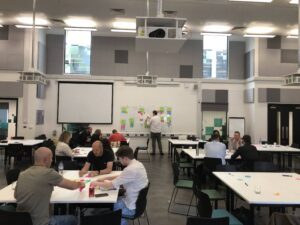
The session I co-ran with Mark Dalgarno took an anti-problem approach, which generated some funny contributions and stimulated some great discussion.
In conclusion
I’ve long been a fan of the Lean Coffee approach to setting a meeting agenda, and the unconference format just takes this up a level.
(Democratising the agenda – my previous blog post about Lean Coffee)
A day is long enough for such an open format but I felt that the sessions were only as hit-and-miss as what you’d encounter at a formally planned conference. The bonus here was the inclusivity, and the opportunity to shape the agenda meant I knew there would be a space to focus on something that I really cared about. The whole approach created a very relaxed and colleagiate feel which is well suited to the higher education community, and in many ways reminded me of past IWMW conferences run by the community, for the community.
The whole experience has prompted me to think about how we might do something like this internally for the Edinburgh student recruitment community. And if/when Educamp run another unconference, I’ll be there for sure only next time I’ll make sure there’s a decent contingent of people from our team with things to contribute!
Thanks to everyone in the UK Educamp team for pulling this together and to the University of Sheffield for being such great hosts.
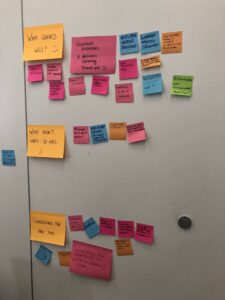
The feedback for the day was excellent, with some great ideas for what could be done differently next time.
More reading
We attended EduCamp, and here’s what we learned… – a blog by Create/Change
Minimal Viable Unconference – a blog my Matt Jukes
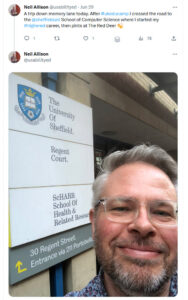
The unconference was held just over the road from where I first started work in higher education nearly 25 years ago. Twitter post reads: “A trip down memory lane today. After #ukeducamp I crossed the road to the @sheffielduni School of Computer Science where I started my #highered career, then pints at The Red Deer”




1 replies to “Attending EduCamp, an unconference for higher education”